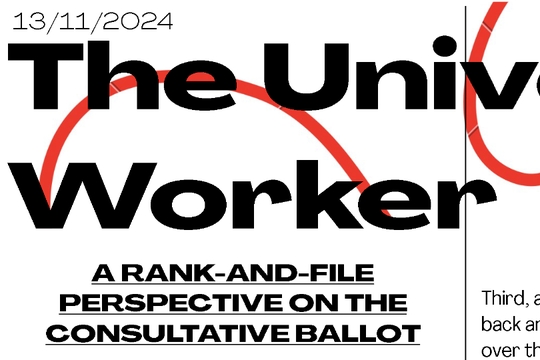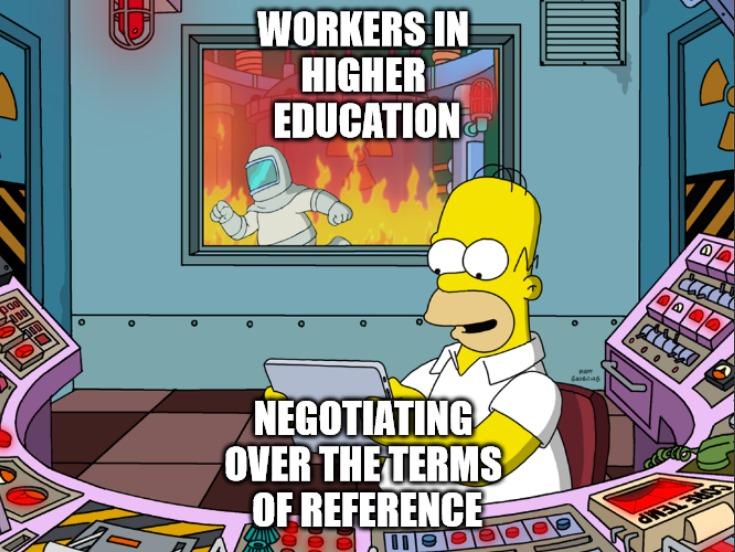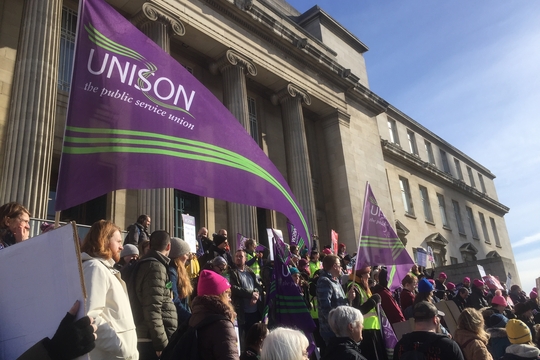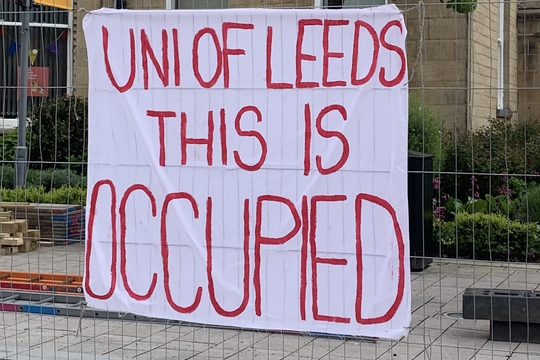A rank-and-file perspective on the consultative ballot

bulletins
A rank-and-file perspective on the consultative ballot
by
The University Worker
/
Nov. 13, 2024
Turning the ballot into an organising opportunity
Readers may be surprised to hear that UCU is balloting higher education members. The announcement on Friday 8th November was easy to miss. In short, UCEA has made an offer for 2024-25 of a staged approach with pay increases ranging from 2.5% to 5.7%. In addition, it also includes a “commitment to negotiate with the purpose of seeking to reach agreement in respect of contract types, workload and equality pay gaps.” UCU nationally is recommending that we vote to reject the pay part of the offer, but accept the terms of reference to negotiate on the other parts.
The consultative ballot is the result of wrangling in the bureaucracy. Despite the Higher Education Committee (HEC) deciding months ago that there would be a ballot, it has now landed with little communication. There is little doubt that many members will not be aware that a ballot is happening, let alone what is at stake in the ballot.

First off, the ballot is important as Unison members in higher education are also in the process of balloting. UNISON will begin a strike ballot now in January. As discussed in our last bulletin, there has been some wavering already, risking their ballot being pulled. A successful consultative ballot would give confidence to other workers in the university. It would also be a step towards the possibility of coordinated strike action and building an industrial union for higher education in the future.
Second, the consultative ballot is important as it opens up a debate on the need for a campaign over pay. Unlike many other public sector workers, we are yet to be offered any kind of above inflation pay rise, let alone any semblance of pay restoration.
Third, a failure on this consultative ballot will set back any possibility of a serious and sustained fight over the future of higher education. Pay is important, but improvements in this area are only one part of the issues facing the membership. Moreover, given the failure of the current government to rethink the HE funding model, it is important to signal that the sector cannot be made sustainable by worsening our working conditions.
The most worrying part of the ballot is that we are being asked to accept that industrial action of casualisation, gender pay gap, and workloads is effectively over. Despite the “four fights” campaign being championed by some parts of the
bureaucracy, it has now been cast aside. For those of us who want to transform our working conditions and the sector, these were never just issues to use in a faction fight within the union. However, given the silence on their selling out, it appears this has been the case for others.
Many of us are facing worsening conditions, redundancies, and a sharpening of casualisation as student numbers become clear. These non-pay elements of the campaign are central to how universities are being reorganised during this crisis. The lack of a mandate for higher education has emboldened managers. Across higher education they have been giving one another the green light to make cuts and restructure, making quick money-saving changes while worsening working conditions and equalities. The only way we can push back is through emphasising how interconnected all these issues are.
Fourth, a ballot is an opportunity for us to put our rank-and-file organising into practice. The silence on the ballot from the national leadership is instructive, but many local branches are also pretty quiet. Many members feel let down by the absence of any coordinated campaign against redundancies and the collapse of the promised four fights. In the absence of a clear political path forward that challenges austerity and rising fees, fears about the financial situation of universities make for difficult organising conditions.
A ballot is a significant opportunity to talk to workers across the university. Yes, we should encourage other members to vote for strikes, but it is also an opportunity to speak to each other about our work and what we want to change together. Workers across higher education have been organising for Palestine, and now is an opportunity to build on that strength.
Rather than complaining about how the national leadership have fucked up (yet again), we need to start from where we are now:
- Speak to your colleagues about their work
- Get the local branch to call a meeting - and organise one anyway if they don’t
- Reach out to the Unison and other campus union branches about a joint meeting
- Organise a day to knock on doors, message, and call members about the ballot
- Come to the next Rank-and-File dayschool to share how it had been going and hear from others
We need this kind of organising whether there is a consultative ballot or not. If we want to build a campaign that challenges UCEA and takes on the government and the funding model, we need to build a rank-and-file that can deliver on it.
This will mean challenging the leadership of the union, developing campaigns ourselves, and using our tactics and strategies. We may have to fight with the local branch leadership or build out new networks. Our comrades organising in American higher education have argued that we need to be in it for the “long haul.” We need to make this ballot a step towards that. The fight for higher education cannot wait.
Join the November University Rank-and-File Call
We’re organising a call for Rank-and-File University workers to discuss how the consultative ballot is going, share experiences, and what we can do next.
4PM SUNDAY, 24TH OF NOVEMBER ON ZOOM
Sign up here: https://lu.ma/apqbn8j6
We are aiming to build towards an in person meeting in January 2025.
author
The University Worker
Subscribe to Notes from Below
Subscribe now to Notes from Below, and get our print issues sent to your front door three times a year. For every subscriber, we’re also able to print a load of free copies to hand out in workplaces, neighbourhoods, prisons and picket lines. Can you subscribe now and support us in spreading Marxist ideas in the workplace?
Read next


